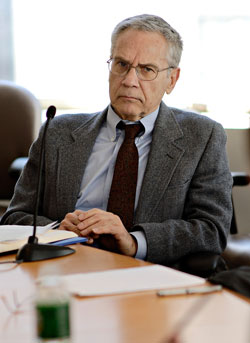In Focus - The Beat Goes On
| During his 16 years with theNew York Times, where he was national education correspondent, Gene Maeroff filed stories from virtually every state in the nation-'"not just on K--12 issues, but also pre-K, higher education and graduate schools. He began his career as an education writer in 1965, the year Congress passed the original Elementary and Secondary Education Act. In the mid-1970s, he identified and revealed the national decline in SAT scores. He covered the closing of the City University of New York during the city's fiscal crisis, quoting the president of City College saying that it was "the first time the sinking ship deserted the rats" (referring to the experimental animals left behind in the labs). In New York, he covered the early years of decentralization in the New York City public schools, the beginning of open admissions at CUNY, the confrontation in Brooklyn in the early 1970s over the busing of black students from East New York into what were then all-white schools in Canarsie, and the work of every schools chancellor from the very first one, Harvey Scribner, through Frank Macchiarola.
"The thing that's most impressive to me is that he's covered education for 40 some years, and he's still fascinated by it - its importance and subtleties and details," says Colvin. "He's still very much acting in the role of a reporter who goes out into the field to explore new things and explain them to people. His new book, which is coming out in September, argues that schools should conceptualize age four through grade three in a child's life as a distinct educational period, so that kids get to the fourth grade with the requisite skills. He's out ahead on that - there are a few places trying that idea, but he's focusing national attention on it. His last book was the first to do an in-depth examination of online education. And he did the same thing as head of Hechinger, in terms of identifying what issues were not being covered and bringing in the best people to talk about them." |
Yet at the same time, Colvin says, Maeroff has never been "captured by the field."
"Despite how long Gene has been doing this, you'd still have to say that his views lie somewhere outside those of the education establishment," Colvin says. "Take the issue of teacher compensation. Most reporters don't take into consideration that teachers, despite their modest salaries, are one of the few classes of people in this country who get defined benefit plans instead of defined contribution plans for pensions. Gene was saying years ago that that would become a huge problem as the teaching force aged, and now that's coming true."
In January, Maeroff, who has remained active at Hechinger since turning the reins over to Colvin in May 2003, became a non-resident senior fellow of the Institute. He will remain on the Institute's advisory board and conduct projects, including an examination of the accountability movement in higher education. He also plans to travel more, play more tennis and contemplate his next project. But to Colvin, his predecessor's mark is indelible.
"Everywhere I go, people ask, 'How's Gene doing? What's he working on?' Colvin says. "My whole job has been made infinitely easier because Gene established Hechinger's credibility and people still associate it with him. And that will always be true."
To learn about Maeroff's new book, Building Blocks: Making Children Successful in the Early Years of School, visit www.genemaeroff.com.
Published Monday, Sep. 18, 2006
